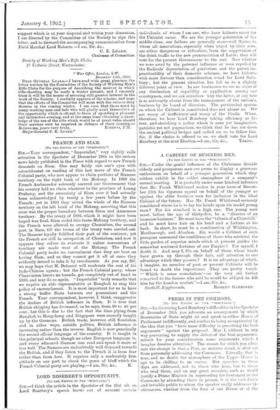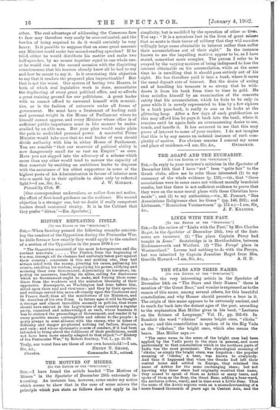PEERS IN THE COMMONS.
[To THE EDITOR OF THE " SVIICTATOR.'l SIR,—In discussing Lord Rosebery's difficulties in the Spectator of December 28th you advocate an arrangement by which Secretaries of State might sit and speak in either House of Parliament indifferently, and confess to being so captivated by the idea that you "have some difficulty in perceiving the best arguments " against the proposal. May I, without in any way presuming to supply the defect of the best arguments, submit for your consideration some arguments which I imagine deserve attention ? The reason for which you advo- cate the change is that a Peer, as matters stand, is shut out from personally addressing the Commons. Literally, that is true, and no doubt the atmosphere of the Upper House is apt to be chilling to an orator. But speeches in these days are addressed, not to those who hear, but to those who read them, and on any great occasion, such as would justify a Prime Minister in superseding his lieutenant in the Commons by attending there in person, it is the vast dumb and invisible public to whom the speaker really addresses Lis utterances, whet_her_ from the floor of one House or of the other. The real advantage of addressing the Commons face to face may therefore very easily be over-estimated, and the burden of being required to do it would certainly be very heavy. Is it possible to suppose that on some great measure any Minister could make two second-reading speeches? If he tried, either he would distribute his matter and make two half-speeches, by no means together equal to one whole one, or he would rise on the second occasion with the dispiriting consciousness that his hearers already knew all he had to say and how he meant to say it. Is it overstating this objection to say that it renders the proposed plan impracticable ? But that is not the worst. Our system of having two Houses, in both of which real legislative work is done, necessitates the duplicating of every great political office, and so affords a great training ground for our politicians. A great leader with us cannot afford to surround himself with nonenti- ties, as is the fashion of autocrats under all forms of government. He must have a lieutenant of leading rank and personal weight in the House of Parliament where he himself cannot appear, and every Minister whose office is of sufficient public importance must in like manner be under- studied by an able man. But your plan would make plain the path to undivided personal power•. A masterful Prime Minister would take care that no real leader of men should divide authority with him in either House of Parliament. You are sensible " that our reservoir of political ability is now dangerously small for so vast an Empire " as ours. Have you not slipped into the advocacy of a scheme which more than any other would tend to narrow the capacity of that reservoir by enabling an ambitious leader to dispense with the assistance of his ablest supporters in some of the highest posts of his Administration in favour of inferior men whose merit lay in their aptitude to shine only by reflected [Our correspondent undervalues, or rather does not notice, the effect of first-hand guidance on the audience. His second objection is a stronger one, but we doubt if really competent leaders dread oratorical rivalry. It is in the Cabinet that they prefer " dittos."—En. Spectator.]







































 Previous page
Previous page